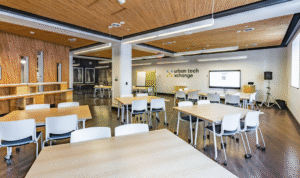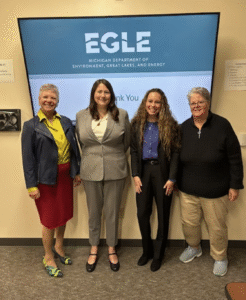
- Kim Kisner
- Business
- 04/16/2024
Local Organizations Work to Mitigate Health and Environmental Risks
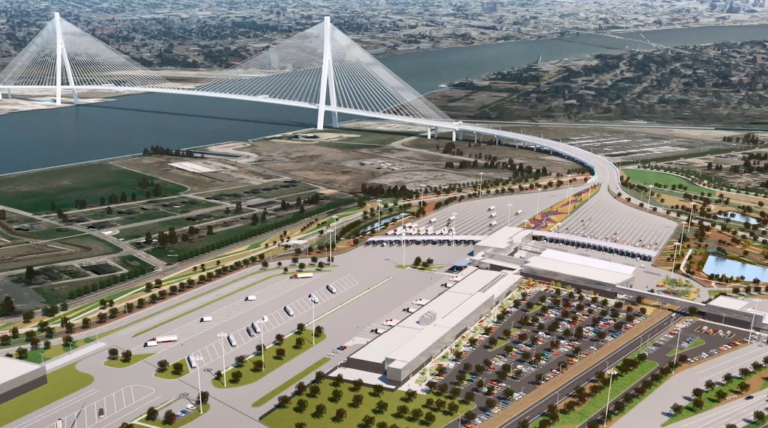
The Gordie Howe International Bridge – currently under construction – is a 167-acre suspension bridge spanning .53 miles, which is the longest main span of any cable-stayed bridge in North America.
The impacts of the construction and future operations of the bridge in the Delray area in Southwest Detroit are formidable.
Finding ways to assist businesses and residents and keep the community healthy and sustainable while a once-in-a-lifetime infrastructure project like this occurs has been the focus of several community groups.
SBN Detroit spoke with Simone Sagovac, project director at the Southwest Detroit Community Benefits Coalition, and Laura Chavez-Wazeerud-Din, president and CEO of the Southwest Detroit Business Association, who are leading initiatives in the community to ensure the interests of businesses and residents are protected.
The Southwest Detroit Business Association (SDBA) is a coalition of businesses and community interests committed to facilitating a stable and economically healthy Southwest Detroit.
The Southwest Detroit Community Benefits Coalition is a community-initiated organization of residents and stakeholders in the direct impact area of the Gordie Howe International Bridge, whose mission is to seek protection for the quality of life and health of those facing impacts.
Q: What impacts are the construction of and existence of the Gordie Howe International Bridge having on the Delray area?
Sagovac: It has reshaped the entire neighborhood. One-third of the Delray community has been replaced by this development; 250 families were relocated, and more have chosen to move. Over 50 businesses are gone, and others are trying to figure out how to remain prosperous. Many small businesses are owned by people who live in Southwest Detroit. For the hundreds of residents still living in Delray, community amenities are no longer there, and more truck impacts are coming.
Chavez-Wazeerud-Din: The transformation of the Delray community is undeniable, and while we understand that progress often brings change, our focus remains on addressing challenges faced by local businesses. The ongoing street closures pose challenges for customers trying to reach the area, while construction-related dust and debris impede pedestrian traffic. As a result, some businesses have opted to relocate downriver.
Q: What is your organization doing to address these issues and mitigate the risks for residents and businesses?
Sagovac: We helped initiate a Home Swap program with the city where residents can swap their homes for a land-bank house. About 100 families have chosen to do this. These houses are fully renovated, including new roofs, furnaces, HVAC, interiors, and more. This is a great program, but there are only so many land bank homes available to meet the needs, and some residents want to stay. For those who moved, it’s tough to replace a community you once were a part of.
The I-75 Environmental Mitigation Program offered home mitigations such as improved HVAC systems, insulation, and new windows to address noise and air quality impacts from increased truck traffic. The Delray Home Repair Program provided these same options for new roofs and furnaces.
We are also working with the state and the University of Michigan on air monitoring and tracking emissions.
We’re working with other Southwest Detroit organizations and SDBA on truck traffic solutions – dealing with trucks that are currently being rerouted into neighborhoods and creating significant challenges for residents and the business corridor.
Chavez-Wazeerud-Din: The SDBA supports nearly 900 local businesses by offering access to meaningful programs and resources. One resource is our Façade Improvement program, which has been instrumental in helping businesses maintain their relevance and appeal. We’ve extended this program to businesses located on Springwells Street and West Vernor Highway, among other areas.
We also are actively engaged with the bridge authority, advocating for a portion of the recent $2.3 million grant funds to be allocated directly to businesses in Southwest Detroit.
In addition, we are developing an Experience Southwest Detroit Campaign, recognizing that the increased traffic resulting from the bridge will impact the area. Our goal is to encourage people to stop for meals and retail purchases, allowing them to truly experience the character of Delray and Southwest Detroit, rather than simply passing through.
Q: What is being done in terms of buffering and preserving the neighborhoods?
Sagovac: We are still seeking additional buffering along I-75 and truck routes and are working with the city and state on this. This is covered in the Delray Neighborhood Framework Plan.
Chavez-Wazeerud-Din: We’re collaborating closely with the city and planning department to enhance the safety of the corridor, prioritizing its walkability once more.
West Vernor Highway has unfortunately become a main thoroughfare for semi-trucks, posing serious safety concerns for businesses and residents alike. As a result, we’re actively addressing truck routing issues, and we’re optimistic that the Joe Louis Greenway will alleviate some of the traffic on West Vernor Highway.
We are involved in the Detroit Intermodal Freight Terminal project to support businesses and the economy in Southwest Detroit by improving freight transportation opportunities.
Q: What are the biggest challenges and opportunities?
Sagovac: Living with extreme daily truck traffic impacts the community’s health and quality of life deeply. It also damages and devalues property. We are working with the city and many others to bring all forms of solutions, including better truck routing, new infrastructure and zoning, and other policies that will create a quality of life that any family should expect. We also need the support of trucking businesses to ensure their policies and their drivers respect all the traffic safeguards to protect our shared community.
Chavez-Wazeerud-Din: Southwest Detroit embodies resilience, characterized by its gritty spirit and the determination of its do-it-yourselfers, a legacy spanning over a century. Business owners and residents (who are often the same) have been impacted and marginalized for a long time. Despite these challenges lies an opportunity: There are funds and resources available to build a more sustainable community.
This community, with its rich history and vibrant culture, is not just worth saving – it’s worth nurturing and celebrating for generations to come.
Be sure to subscribe to our newsletter for regular updates on sustainable business practices in and around Detroit.
Kim Kisner
- All
- Business
- Community
- Education
- Events

Citizen Robotics is a Detroit-based nonprofit that advances the use of robotics and digital manufacturing in residential construction, focusing on improving productivity, sustainability, and long-term affordability. Best known for its early work in 3D-printed housing, it explores how alternative construction methods and new financial models can reduce material waste, lower lifetime operating costs, and enhance the resilience of homes. SBN Detroit interviewed Tom Woodman, founder and president of...
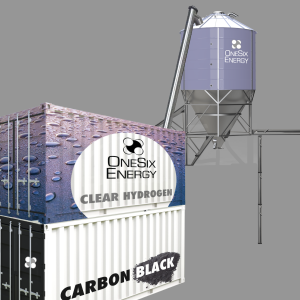
Detroit-based OneSix Energy is a clean-energy technology company focused on advancing a lower-carbon approach to hydrogen production. Headquartered at Newlab in Detroit, the startup is developing a proprietary methane pyrolysis system designed to produce hydrogen without carbon dioxide emissions, while also generating solid carbon as a co-product. SBN Detroit interviewed with cofounder Stefan Sysko about the company’s origins, its approach to hydrogen production, and why Detroit is positioned...
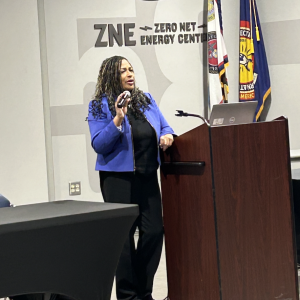
Regina Strong serves as Michigan’s first Environmental Justice Public Advocate, leading the state’s Office of the Environmental Justice Public Advocate. Her role focuses on addressing environmental justice concerns raised by communities, helping residents navigate environmental systems, and working across state agencies to improve equity in environmental decision-making. SBN Detroit interviewed Strong about the challenges communities are facing across Michigan and what environmental justice work looks like in practice....





